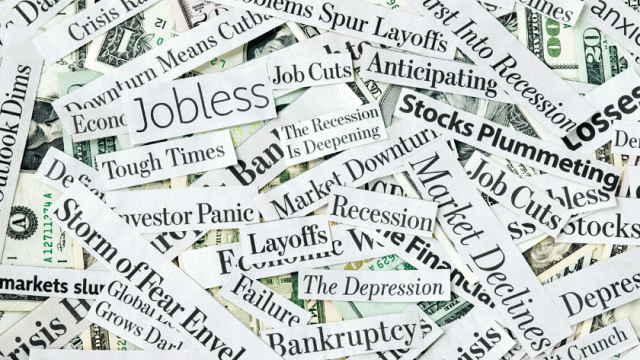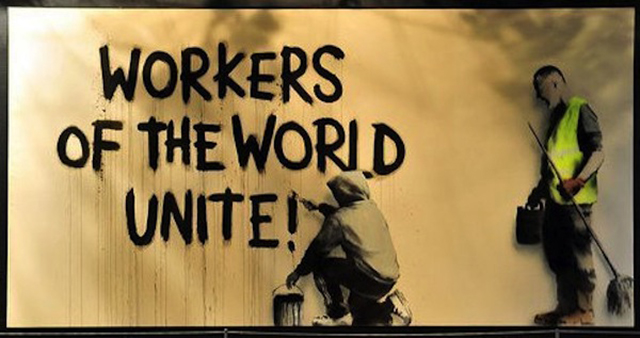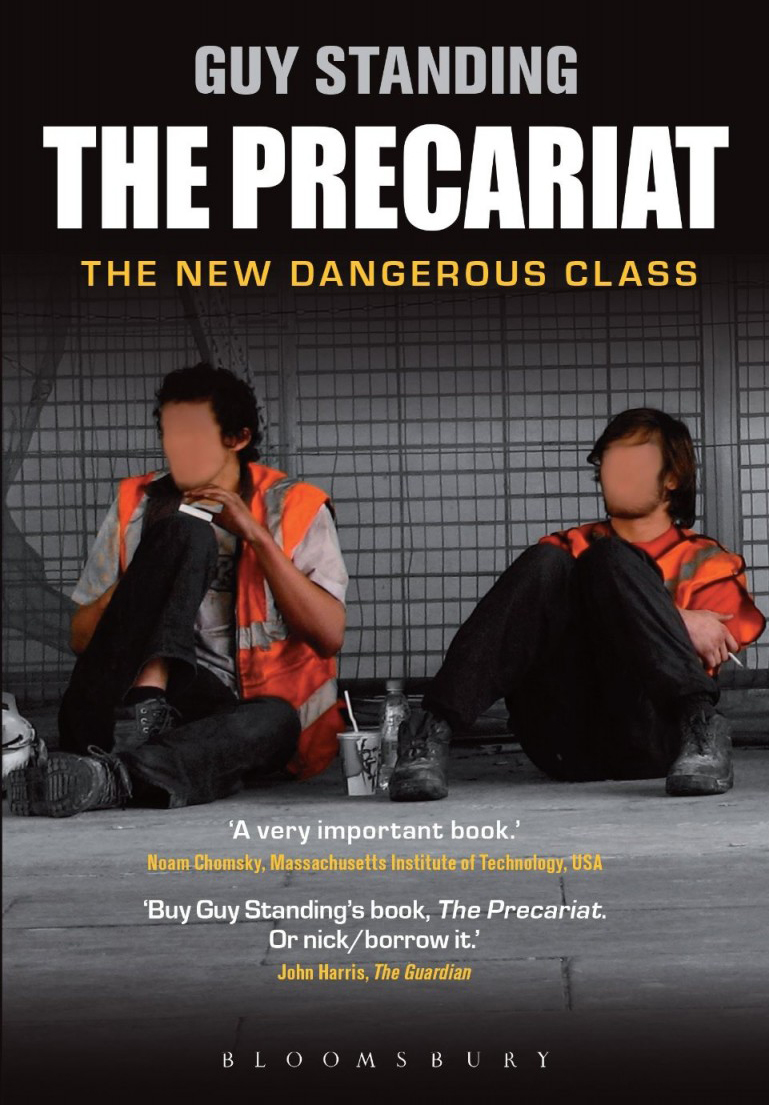
“A counter movement is taking shape, and one does not have to be much of a futurologist to appreciate that government and international reactions to the multifold crisis following the 2007-08 crash were, and are, unsustainable in the medium term,” writes Professor Guy Standing in "A Precariat Charter: From Denizens to Citizens," which launched last month.
The book predicts the neoliberal epoch’s demise with two potential outcomes: one dystopian, where the values and ethos of neoliberalism extend into “something close to neo-fascism, with authoritarian control over the minorities.”
An opposite one results neither from reform nor radicalism, but from a "progressive counter-movement to re-embed the economic system in society, with new mechanisms of regulation, social protection and redistribution,” according to Standing.
"A Precariat Charter," published just before the recent European elections, provides a timely framework to analyze the recent populist shift in the political landscape. Several weeks ago, voters continent-wide lurched toward parties outside the traditional spectrum – witha counter-swing against the neoliberal consensus from Syriza, a radical-left coalition that won in Greece, and Spain’s Podemos, a new party emerging from the 15M movement. Both victories reflect Standing’s description of an emerging progressive counter-movement.
The more significant swing, however, has been to the far right. In Britain, the biggest winner was the openly racist and xenophobic United Kingdom Independence Party (Ukip), while France’s Front National and the Danish People's Party also took in a quarter of their countries' votes. For the first time, a German neo-Nazi party won a seat in European Parliament, as further far-right gains occurred in Finland, Hungary and Astria.
Five Ways the Financial Crisis Helped the Rightward Push
With an overall focus on the U.K. and U.S., "A Precariat Charter" nonetheless provides five reasons for the shift to the far-right as it applies to post-financial crash Europe.
Firstly, it tells how in the globalized era, the neoliberal dogma has been accepted by all the major parties. Standing explains, “There is a vacuum on the left, possibly for the first time in history.”
Secondly, he asserts that social democrats have capitulated, been complicit and even started competing to "out-nasty" parties of the traditional right in terms of cuts and austerity policies. The book draws on examples from U.K.’s New Labour and both the Clinton and Obama administrations.
Thirdly, "A Precariat Charter" tracks how social policy is currently being guided by a blend of Christian neoconservative values with neoliberalism. An influential example is Lawrence Mead, a close policy advisor to Prime Minister David Cameron within the ‘Nudge team.’
Standing explains the ways Mead has promoted prejudice to justify welfare attacks; Mead himself stated that the poor must be induced to blame themselves. Standing also quotes the Secretary of State for Work and Pensions, Iain Duncan Smith, who said that “not accepting work is a sin” and, more shockingly, “work actually helps free people.”
“The state is becoming more directive and punitive towards minorities, proposing collective forms of punishment by caricature,” Standing concludes after pointing out how one or a few incidents are often used to demonize whole groups of people. This includes labeling the unemployed as “shirkers,” migrants as “illegal, dirty, alien, terrorists,” and single mothers as “welfare queens living in mansions.”
Additionally, youths are called “lazy and non-contributing,” while the government has pushed the notion that disabled people are in fact “faking it.” Within this scapegoating political landscape, UKIP’s torrent of homophobia, racism and misogyny has been legitimized and normalized.
Fourthly, Standing blames plutocrat-owned media for catalyzing a shift to the far-right. He says the current mainstream media “enable them to assert untruths with impunity and reinforce prejudice.”
Fifthly, the book analyzes how neoliberalism – and particularly today's austerity politics – have sharply impacted the emerging class of people known as the precariat.
The precariat class includes workers with few guaranteed rights and low pay; those who have lost jobs and can only claim benefits according to the whims of job center officials; and students working as unpaid interns and bonded in debt servitude. Not least, the precariat include the exploited class of migrant workers as well as disabled people who increasingly find themselves stripped of their benefits and basic rights.
It's Time to Talk About the Precariat
Crucially, in describing the shift to the right, Standing highlights the danger of populist demagogues pushing discrimination while provoking something of "a class at war with itself."
An example is the way workers on zero-hour contracts with reduced public services can be convinced to blame minorities for their economic ills – although they are victims of job cuts, too. The schism draws attention away from the real culprit: the small minority of ultra-rich who profit from the cuts.
Featuring 29 charter proposals, Standing also lists six different types of rights, ten features that define the precariat, and six forms of systemic crisis in the current economic-political system. His inventory style is both readable and packs a massive amount of enlightening analysis into its 250 pages.
Standing undermines neoliberalism at its base, rejecting the notion that "competition and efficiency are vital and necessary components for a free market economy" – a mantra used by mainstream parties to advocate privatization, unrestricted markets and cuts to public services.
"A Precariat Charter’s" core purpose is to outline principles that will help us become an ethically transformed society – through steps that are broadly encompassing, inspiring and easy to imagine.
Those principles include providing every citizen with a universal basic income, which is enough to survive on while also encouraging work. (Standing was involved in a pilot project to provide basic income in India, where people in eight villages were given an unconditional monthly cash transfer, resulting in major improvements to their nutrition, education and quality of life.)At the same time, a large-scale redistribution of wealth would be made possible by simply ending the corporate subsidies and tax breaks that solely benefit the rich.
In addition, "A Precariat Charter" calls for ending workfare and means-testing; student fees and predatory lending, and the poor or degrading treatment of minorities. Standing argues that globalization unleashed such a massive attack on workers' rights and union power that a new popular approach is needed.
Reflecting back 799 years to the Magna Carta, he writes: “Every new march towards a new more emancipated, egalitarian society is about three struggles... struggles for Recognition, Representation and Redistribution.”
Regarding Representation, Standing asserts the need for a new means of collective action, and he sees the initial stage of the Occupy movement as a part of this. In his view, however, the movement knew more about who it was against – the 1% – than who it was.
Whether or not there is a Precariat is, according to Standing, the most crucial question. “Because if it is: it becomes transformative.” No doubt, Standing’s hypotheses will be tested in the coming years as the system – which relies ever more on the Precariat class to prop it up – gets closer to a breaking point.
View Steve Rushton's Commons page to learn more about him or read his other articles.
3 WAYS TO SHOW YOUR SUPPORT
- Log in to post comments
















